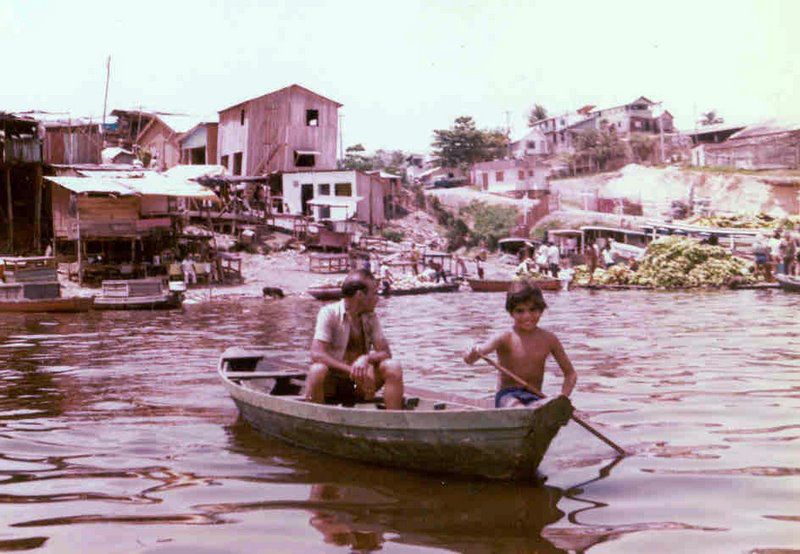

August 12 - Bus trip ended at 5.15. a.m. when I checked into “Litoral Palace Hotel” next to Rodoviária. On trip, noticeable how the true sertão gradually disappears. As you approach Teresina, capital of Piaui, the caatingas give way first to similar vegetation mixed with small palms, then a more benign landscape and beyond Caxais true African style veld. Green in spite of winter and with denseness that is suggestive of the great Amazon belt that lies close to the north.
I was thinking as we passed through one of the innumerable dusty/ poor/ ugly/ depressed towns of Piauí/Maranhão that this must be a world away from what the rich of Rio/ São Paulo know. I doubt whether one in a hundred have ever been here or seen any of this beyond TV. And if that is the case, how much more aggravated was the difference in the past, without “easy” communication of today?
Windowless room in Belem "Litoral Palace" with giant fan, the size of an old plane prop. Woke at 12 and went to city to learn that the only boat to Manaus departs this p.m. Next one is on September 4 (perhaps.) Decide to Go.
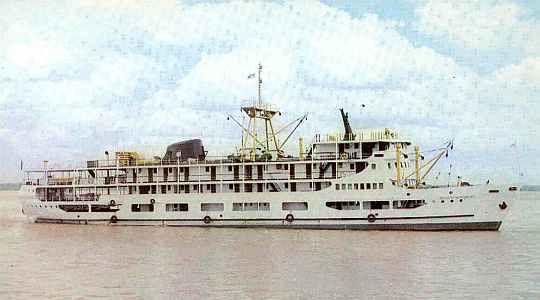
August 13 Aboard Augusto Montenegro, up at 5.30 a.m. to witness spectacular sunrise, faint to deep orange sun rising over line of trees, climbing quickly into sky and by 9.30 making it as hot as midday. Size of River (Para) on approach to Amazon is truly “river sea.” Difficult to imagine impact on early voyagers like Orellano and Raposo Tavares reaching Belém from upstream.
Isolated settlements on river banks, buildings hugging shore line, church, bordered by trees. Most sobering thought is that their only access to “civilization” is along the river. Hemmed in by forest, somewhat like an island; dozens of island “refugia” between forest and river. At point we're approaching now, water to furthest horizon, brown tinge to it.
Many estrangeiros aboard, international mix, Brazilian, French, Canadian, Israeli, American, English, German, students, retirees, holiday-makers, most with idea of once in a lifetime Amazon voyage. Agree. We're all traveling second-class; there's a First Class deck above and a deck “squatters” passage below and aft.
August 14 - Why the Amazon has been called a “river sea” is easily imaginable. The extent of the river is such that glancing to one side, say starboard, you fully expect to be coasting along “offshore,” and if you turned round to port, there'd be the ocean! Everyone encountering the Amazon for the first time finds it larger than they expected. Difficult accepting that for five days you will be aboard a major-sized ship moving along the greatest (by water volume) river in the world. You have a problem seeing that very distant line of trees as the edge of the river and not a vast lake or the sea.
Of course, there is a monotony to the trip, the same border scene, mile after mile, varied occasionally by a lonely house or small settlement, rarely what could be considered a town. Between leaving Belém and 12.30 today first major town (population 21,000) was Almeirim.
Keep trying to think of what journey must have meant to Raposo Tavares. Even today with only a five-day passage, people complain of boredom after two days. What must it have been like for Raposo Tavares? Week after week, as they passed along Madeira River to Manaus, and to Belém.
Very noticeable to me is complete absence of wild animals at the river's edge, so totally unlike even the smallest river in the wilds of Africa. Here, nothing!
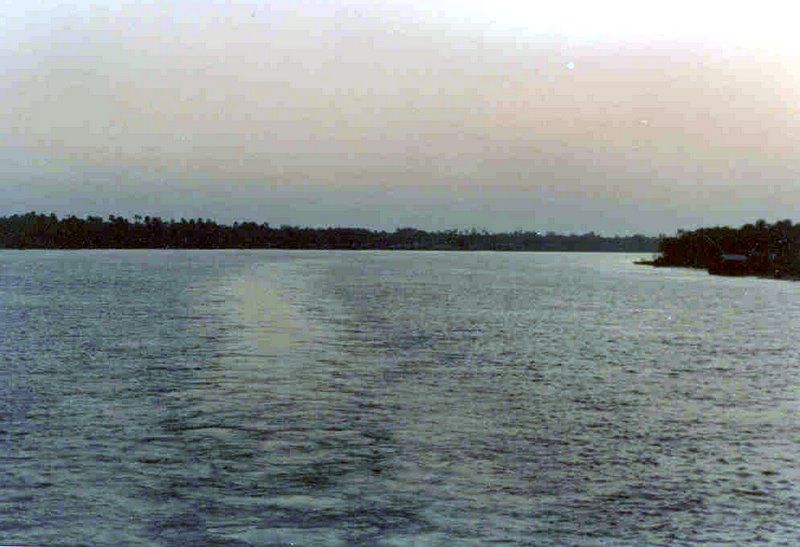
Still find it difficult to come up with definition of "what" the Amazon is — Perhaps better to brood over it for a couple of days. — So many approaches:
1) A hypothetical one, for example: What if the riverine line of forest had only been a narrow one? And the lands beyond open to colonization? Would this not have been the focus of “civilization” in the Americas? Would the Andean cultures have spread into these areas?
2) Perhaps, in a way, the repetitive and boring aspect of this trip is for the very reason I state in my book proposal: The failure to see the whole, to comprehend how infinitely small this ship and its occupants in relation to the River; the failure to appreciate the symbiosis of river and nature.
3) Can see some likely effects the River can have on Brazilian outlook, for example, in reinforcing the knowledge of just how little impression they as a people have made against the vast lands they hold.
4) Serves to reinforce the Contrast, here the limitless land, and in so many other places, the struggle for ownership of the smallest patch of territory. Here is a “land problem” of a very different sort.

Green. Every shade of green possible, the patches of hyacinth floating downstream, the great trees to the water's edge, the canopy of the forest lower than one would've imagined it to be, low and dense, the sameness and yet a difference even to the untrained eye.
Have really to remember just how vast this is to understand what it must've been like for the early discoverers. Almost like being trapped in a tunnel, a water maze. Once you started out upon it, you had to complete the full journey. Penetration of the forest itself as an outlet would be impossible; follow any tributary and you would be led down another blind alley. Once you began you'd be locked into the main river until it reached the Atlantic.
Most memorable of shipboard characters: An old English couple who have lived in Brazil for forty-five years, Alan and Brenda. He was in insurance, came here in the 1930s after Fawcett's disappearance. In the 1940s he flew to Manaus; now retired, he is doing the trip again. Sitting in lounge, Somerset Maugham characters, playing cards after siesta. Brenda's memorable quote the other night was that after all these years she had not become i.e. gone "Brazilian" and went “home” last year. (Returned via South Africa about which they hold typical conservative views.)
Other travelers include noticeably older generation of Europe-style backpackers. They're a decade away from their first trip to Europe, moving into their 30s, too independent to come to terms with the "responsibilities of growing up.”

August 15-16 Approaching, docking at and passage from Alenquer beyond Santarém late afternoon and evening gave dramatic impression of The Amazon.
The river divided into five channels with ship sailing in one furthest east and, far as the eye could see, these expanses of water separated by low strips of lands, occasionally merging, most continuing their separate way toward some distant meeting point. An hour time change — advance — at Santarém brought sunset early, a magnificent ball of orange, larger than any I have ever seen, going down with surprising rapidity, dancing behind the bank of trees as the ship moved along, sometimes obscured, sometimes appearing full circle in a gap between the forest. At water's edge, herds of zebu-type cattle standing white to gray against the darkening background. Channel narrower than ever.
Then, within minutes of the sun setting, the moon rising in the east, a smaller, perfect yellowish ball, also climbing swiftly and perfectly marked against the clear sky. Then night and the Amazon closing in — not the towering impression offered in Hollywood interpretation of small riverboat cutting through impenetrable forest but surrounding our ship with its vastness and the knowledge that way out there, only an endless expanse of uninhabited forest.
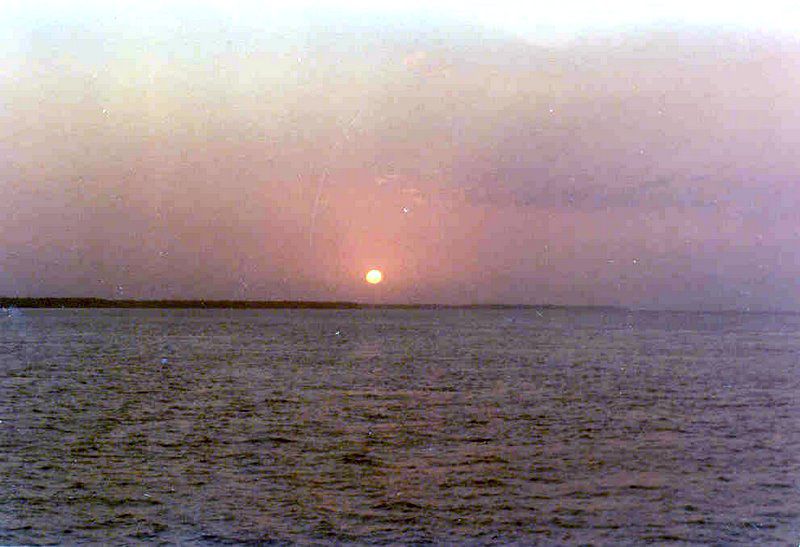
A scene my characters, Amador da Silva and Segge Proot would come to re-live in the pages of Brazil:
"The constant green and gray and blue was also relieved — especially for Segge — by the dance of sun and moon on the equator. Daybreak and a faint blush in the gray would presage the rim of orange sun behind the trees. The surface of the river would be painted in way no mortal artist would emulate, passing through a spectrum of shades, from soft pinks and mauves to a fiery blaze that turned the waters of the Rio das Amazonas into molten gold.
These changes came with amazing rapidity as the sun climbed above the forest, its intensity giving a man from Europe the impression of high noon, when it was not yet mid-morning. At sunset the flaming ball would sink, sometimes seen hovering full circle at the very edge of earth, where there was a gap in the foliage.
After the briefest pause, a small, yellowish moon would rise above the horizon and climb swiftly, the constellations growing pale, the higher it rose. Night would fall, the limitlessness heightened and made ominous by the close, impenetrable world of trees.
At night, we reached Alenquer, a small river port, its dockside crowded with people, sacks of grain... Sounds of countless insects in the marshy land beside the wooden quay. Go ashore for walk through town streets lined with bars. What truly sets the atmosphere is glimpse back toward the ship. Sight of her lying there lit for stem to stern, immaculately white and dwarfing every other boat at dockside. Here, unmistakably, is the picture of the Amazon I have always held.
At Alenquer, I sense a “resentful” reaction to our presence. People on the quay side, mostly young, remind one of scene from Amarcord. It's only twice a month that a large passenger boat comes through and being Saturday night, locals see this as one, if not the only “event.” But they didn't observe us with friendliness, very few smiles, and except two who made “friends” with blonde Elsa, the German girl aboard, not a single wave as the ship pulled away from the dock. Instead some First Class passengers started to throw ice at them and they retaliated with curses and handfuls of grain! Type of incident that does nothing to improve relations between the have's and have-nots.
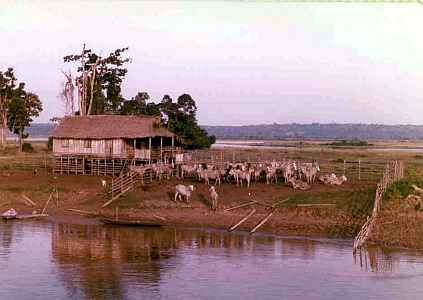
Aboard, there is absolutely nothing to do but brood, meditate, sweat, drink and talk. Ron and Mark, two Aberdeen University graduates, future grain merchants, provide some worthwhile asides on Brazil. Ron maintains that the Brazilian “miracle,” the dramatic economic development since mid-50s had disastrous effects because it came too quickly for people to adjust to it, socially. “They entered the industrial age without capacity to cope with modernization, jarred from a post-colonial and agricultural phase into era of technology. Adopting the methods of an advanced country to one in which the mass of people still existed in backward phase.”
I agree with what he says and have serious doubts about the theory of Brazil as an emergent super-power. The first forty days contact with the people, admittedly of the depressed North-East, offer little hope for what may be a future “super-power.” Again and again, Bradford Burns's suggestion of so little having changed in five centuries as being key to Brazil appears perfectly true.
At one point last night, some of us commented on behavior and service of crew in what is obviously one of the great attractions of Brazil. They're surly, uncooperative, unprofessional, ungrateful. They give the impression of simply not caring, one way or the other. Reflecting on this, a Brazilian at the table said that the difference between them and, say people in the service industry in Europe/U.S. was that here they were an extension of servitude of slavery.
Interesting point, especially when considered against fact that slavery was only abolished in 1889, less than a hundred years ago. Just as there are many misconceptions or ignorance about the finer aspects of Brazilian history, so, too, the darker side. Brazilians pride themselves on the peaceful, humane liberation of their slaves but I'm beginning to believe that the truth may run somewhat contrary, that they have an exceptionally long way to go to finalize the adjustment between slavery/freedom. “Born free to live in chains,” truly applicable!
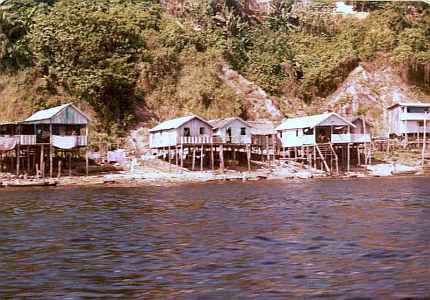
Elsa, the German girl stayed with a casa grande family in Fortaleza and was convinced there is also a racial element: Her hosts kept reminding her that they were “Portuguese,” i.e. “white” of the best sort. The dona of the house boasted that she had already “sold” six servant girls to the south. Elsa took that literally, though I suspect it's more of the South African way of “selling” — the arranging of girls from the farm “good girls” to go south where they're coveted because they're “honest, reliable,” that sort of thing.
Another subject that came up was the “internationalization” of the Amazon basin, once suggested by a U.N. conference but, predictably, violently resisted by the Brazilians. (In the north, among few expressions of political graffiti: AMAZONIA PARA BRASILEIRO.) A young Brazilian passenger himself suggested that this would be only way to “develop” the area properly. From what I have seen and heard about other “development” projects in the North-North-East, I'm inclined toward agreeing. At the same time, I have to consider the effect of the Tropics on Western Man - Perhaps Gilberto Freyre is too optimistic, idealistic - Perhaps the true Brazilian, man of the tropics, has not yet appeared on the scene or developed sufficiently to cope with the land, the climate and its challenges.
Spending time with the two Brits, unfortunately, brings my Brit-background prejudices to the surface and I have constantly to remind myself that this is Brazil and Brazilians are different. Nevertheless, I do find several things disgusting. The spitting. A filthy, ill-mannered and downright unhealthy habit. At least on the ship the aim is over the side! Also on hygiene, a disregard for elementary toilet cleanliness. Lavatories in most places are stinking, blocked affairs with horrid little wastepaper baskets for toilet paper, open and exposed. God knows what germs can be spread this way.
Then, too, the food: With rare exception, usually in private homes, it's the same monotonous starchy stuff, steak, chicken, potatoes sometimes, rice, farina, beans. The food markets in the Amazon ports are the worst I've seen anywhere. Great, open mounds of freshly-butchered meat, minimal vegetables and little to see of the exotic tropical fruits people rave about. An inveterate traveler, I can stomach a great deal but here even I reach a limit.
Where do you begin to build a “modern nation”? Aren't these basic lifestyles important? Cleanliness next to godliness, says the proverb?
I wonder, though, just how much the negative thoughts expressed here are a reflection of the depressed North-East and the unfathomable “green hell.” How heavily do those weigh on a man's soul? What will the contrast be like in the south?
Also discussed the difficulty of bridging the gap between “moneyed (apparently) estrangeiros” and locals aboard prompted by so small an incident as attitude of barman. One senses his resentment of foreigners' continual ability to go up and buy beers, cool drinks etc.. .It would be almost impossible to explain to him that every cent of this was worked for year after year. Says the young Brazilian with us: “They think like slaves.” Or is it simply, a “tropical” don't-give-a-damn mentality?
